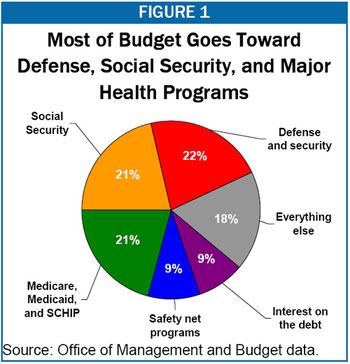'Big Government'
I just finished reading the cover story for U.S. News and World Report-- 'The Return of Big Government: A bulked-up uncle Sam is coming back to deal with housing, healthcare, Social Security, and more'-- and found it extremely lacking. Several pages long, the whole thing could really be boiled down to a few paragraphs. Government bad! Markets good!
The article seems to focus more on perceptions and abstracts-- mostly on tax cuts/rates-- rather than on specific points and programs and what they do, and if they work or not. It takes a very black-and-white position on the debate (voters have rebelled against the "high spending, confiscatory tax rates, and heavy regulation that were the negative legacies of FDR's New Deal and LBJ's Great Society"... right, because the Reagan-era overreactions to those issues have had no negative legacies at all!), exactly the grounds that conservatives want it debated on (the government steals your money canard). This is not a surprise, as the author-- James Pethokoukis-- is a very partisan, free-market conservative (see here).
A discussion of the gray would be nice. Regulating markets isn't exactly nationalizing industry, you know.
Big government is not always bad, and smaller government not always good, and vice versa for both. I can certainly think of areas where 'Big Government' has been good-- New Deal-era initiatives (minimum wage, labor protections, the GI Bill, etc) which we take for granted-- and areas where it is bad-- creating redundant new agencies like Homeland Security, pork-barrel spending, etc. And I can think of areas where limited government is good-- the type of privacy stuff that social libertarians support, no bailing out every failure people run into-- and areas where it is bad-- no oversight or regulation of corporate behavior, etc.
The caricature that this debate often presents itself in is quite present in the comments to the article. Don from OH argues from the right that we need "jobs returning to America" (apparently, the government can't do that, but somehow passing the 'Fair Tax' will), and tells the government to "Cut spending, not my paycheck." AKA, the aforementioned 'government is stealing my money canard'. This comment by Mandy in CO is perhaps nearer to my take-
"For the past two decades Americans have been lectured about the miraculous ability of the free market to solve all life's problems. We were going to trade health care, consumer rights and environmental protections (oh, only in the short run of course; it would all come out right in the end) so that the U.S. economy could flourish unhampered by any pesky oversight.
Well, here we are in 2008. Where do we begin: health insurance more difficult to get than ever, polluted water supplies, dirtier air, a compromised food chain, lead tainted toys, financial institutions run like casinos with rigged roulette tables, credit card operations run like Mafia extortion schemes, highways and bridges crumbling, unsafe airplanes whose maintenance has been outsourced to third world countries flying overhead ... Oh, and the economy itself is headed for the dumpster.
One of the key tenets of the free market system is supposed to be the connection between risk and reward. What we have here is a system where 90% of the rewards go to 2% of the populace and 100% of the risk is being assumed by everyone else."
I think this perfectly hits on the hypocrisy and deceit of 'small government', as argued by the Reagan Republicans.
As their proposed solution to the overhyped Social Security crisis (gut it, privatize the whole damn thing) shows, their instinct is always to throw the baby out with the bathwater. And yet their smaller (and less effective, as the Katrina aftermath illustrated) governments somehow keep producing bigger deficits than those of Democratic leaders. Odd.
One more (related) hypocrisy can be found in this chart I found via Andrew Sullivan-

Yes, this lengthy USN&WR article mentions Social Security and Medicare a bit (though the two are funded separately through specific taxes... the real, general pie looks more like this), yet has not a single mention of military/defense spending, which takes a bigger bite out of that pie than anything else. Lamenting the impending return of
We need to put our fiscal house back in order again, yes, but that is done by electing people who care about competence and efficiency, not about labels and size and anti-government fearmongering. We also need to start paying down the deficit. Maybe this means cutting some (unnecessary) spending, maybe it means, yes, raising taxes. Ultimately, what matters to me most about government is not its size, but whether it is serving the interests of the public, or serving the interests of a limited few.
To the extent that Americans have been very frustrated over government, it is based on a feeling that government is corrupt, and no longer works, or is wasting money (the #1 issue in the 2006 midterm elections, according to exit polls, was corruption)... not a question of big or small. Pethokoukis semi-concedes this at the end, stating "Big government? Small government? Maybe all Americans really want is a bit of effective government." It's a shame he wasted so much breath before figuring that out.


0 Comments:
Post a Comment
<< Home